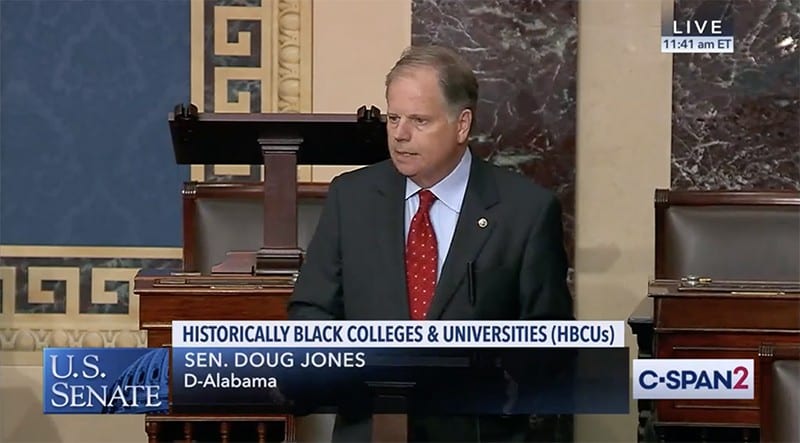In a Single Day, United States House and Senate pass permanent funding for STEM Programs at HBCUs, TCUs, HSIs and MSIs

Media Contact
Monique LeNoir UNCF Communications 202.810.0231 monique.lenoir@uncf.org
UNCF claims success as bill heads to President Trump to sign
WASHINGTON, DC—Today, the United States Senate passed H.R. 5363, the FUTURE Act, unanimously by voice vote, for the second time in as many weeks. The U.S. House has already passed this version of the bill which will permanently extend mandatory funding for Historically Black Colleges and Universities (HBCUs), Tribal Colleges and Universities (TCUs), Hispanic-Serving Institutions (HSIs) and other Minority-Serving Institutions (MSIs) to increase their science, technology, engineering and mathematics (STEM) outcomes, among other things. The bill also eases the burdens on low-income, first-generation college students by simplifying the process for applying for student financial aid. UNCF identified the bill earlier this year as the top priority on behalf of HBCUs and their student population.
“We started this road in earnest months ago,” said UNCF President and CEO Dr. Michael L. Lomax. “There have been ups and down in our pursuit to pass the FUTURE Act to extend mandatory funds for our institutions. However, the spirit of bipartisanship allowed this landmark passage, and we commend our Senate leaders like Education Committee Chairman Lamar Alexander, Education Committee Ranking Member Patty Murray, Sen. Doug Jones, Sen. Tim Scott, Sen. Richard Burr and Sen. Chris Coons for working together to reach a solution for us. Today is truly a historic day for our HBCUs and our students. With this now-permanent funding, we know HBCUs can make a sizeable dent in the 2.5 million STEM jobs currently unfulfilled in our country.”
“With the congressional action on the FUTURE Act now complete, let me note the rarity of this achievement,” said UNCF Senior Vice President for Public Policy and Government Affairs Lodriguez Murray. “Standalone bills like this one that focus solely on minority populations and have a substantial benefit to HBCUs rarely pass Congress in this manner. They usually become part of larger, must-pass pieces of legislation; however, not the FUTURE Act. The last time a substantive standalone bill focused on these populations became law like this was the Minority Health and Health Disparities Research and Education Act of 2000, Public Law 106-525. This is a once-a-generation occurrence. UNCF is so proud to have had a strong hand in this triumph for HBCUs and our students. We are also grateful the White House has already signaled the president’s support.”
UNCF pursued the FUTURE Act with a digital advocacy platform, UNCF.org/protectingourfuture, and online advertising to garner supporters. The result was a groundswell of public support resulting in 65,000 letters and 3,000 phone calls to Members of Congress to pass H.R. 5363. Joining that effort was much of the higher education community, including the following organizations:
- Achieving the Dream, Inc.
- ACPA-College Student Educators International
- American Association of Colleges of Nursing
- American Association of Collegiate Registrars and Admissions Officers American Association of Community Colleges
- American Association of State Colleges and Universities
- American Association of University Professors
- American Council on Education
- American Dental Education Association
- American Indian Higher Education Consortium
- Association of American Universities
- Association of American Colleges and Universities
- Association of Catholic Colleges and Universities
- Association of Governing Boards of Universities and Colleges Association of Jesuit Colleges and Universities
- Association of Public and Land-grant Universities
- College and University Professional Association for Human Resources Common App
- Consortium of Universities of the Washington Metropolitan Area Council for Advancement and Support of Education
- Council for Higher Education Accreditation
- Council for Opportunity in Education
- Council of Graduate Schools
- Council of Independent Colleges
- Council on Social Work Education
- EDUCAUSE
- ETS
- Hispanic Association of Colleges and Universities
- NAFSA: Association of International Educators
- NASPA-Student Affairs Administrators in Higher Education National Association for College Admission Counseling
- National Association for Equal Opportunity in Higher Education National Association of College and University Business Officers National Association of Colleges and Employers
- National Association of Independent Colleges and Universities National Association of Student Financial Aid Administrators National Council for Community and Education Partnerships Phi Beta Kappa Society
- The College Board
- TMCF
- UNCF
- UPCEA
###
About UNCF
UNCF (the United Negro College Fund) is the nation’s largest and most effective minority education organization. To serve youth, the community and the nation, UNCF supports students’ education and development through scholarships and other programs, supports and strengthens its 37 member colleges and universities, and advocates for the importance of minority education and college readiness. UNCF institutions and other historically black colleges and universities are highly effective, awarding 21 percent of African American baccalaureate degrees. UNCF administers more than 400 programs, including scholarship, internship and fellowship, mentoring, summer enrichment, and curriculum and faculty development programs. Today, UNCF supports more than 60,000 students at over 1,100 colleges and universities across the country. Its logo features the UNCF torch of leadership in education and its widely recognized trademark, ‟A mind is a terrible thing to waste.”® Learn more at UNCF.org or for continuous updates and news, follow UNCF on Twitter at @UNCF.